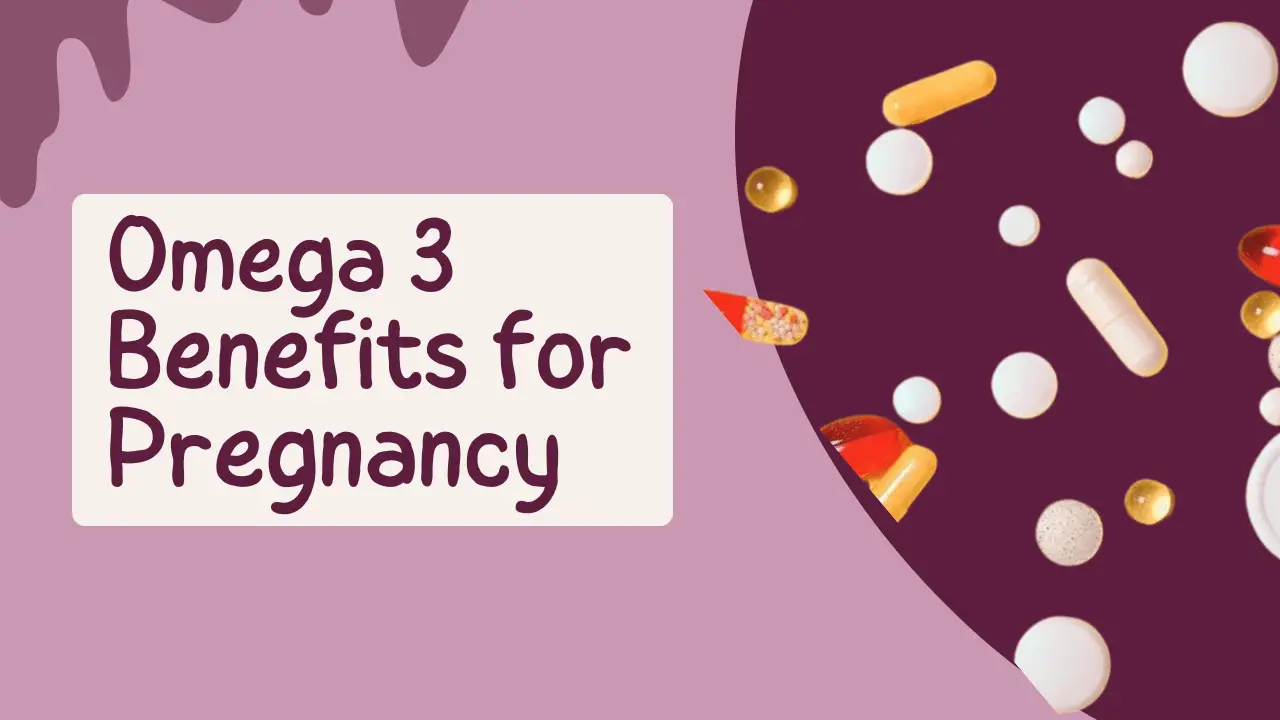Pregnancy is an important time to make sure the developing baby and the expectant mother receive the best nutrition possible. Omega-3 fatty acids are unique among necessary nutrients because of their many health advantages.
These good fats, which are present in foods like walnuts, flaxseeds, and salmon, are essential for several body processes. Supporting the health of both the mother and the fetus throughout pregnancy requires an understanding of the advantages of omega-3 fatty acids.
Omega 3 fatty acids are essential for healthy brain development, eye health, and lowering the risk of premature birth. The top 5 reasons why including omega-3 fatty acids in your diet is crucial for a safe pregnancy journey are covered in this blog post.
Enhanced Fetal Brain Development:
One of the most significant omega-3 fatty acids benefits in pregnancy is their critical role in enhancing fetal brain development. Omega 3 fatty acids, particularly DHA (docosahexaenoic acid), are essential building blocks of the fetal brain and retina.
During pregnancy, the mother’s intake of DHA is crucial for the proper formation of the baby’s brain and nervous system. This nutrient accumulates rapidly in the fetal brain during the last trimester, supporting cognitive functions, memory, and overall brain growth.

Several studies have demonstrated a connection between enhanced cognitive and visual results in offspring and a sufficient DHA intake during pregnancy. For instance, studies show that early childhood cognitive and motor skill assessments were more favorable for children whose moms had greater amounts of DHA during pregnancy.
DHA is also essential for the growth of the cerebral cortex, the area of the brain in charge of sophisticated behavior, decision-making, and thought processes. Expectant moms should try to include foods high in DHA, like fatty fish, supplements made of algae, and items that have been fortified, in their diet.
By doing this, the benefits of omega-3 fatty acids during pregnancy are shared by mother and kid, giving the latter a healthier and stronger start in life.
Improved Eye Health for Baby:
Another crucial aspect of omega-3 fatty acids benefits in pregnancy is the enhancement of eye health for the baby. DHA (docosahexaenoic acid), a type of omega-3 fatty acid, is a major structural component of the retina, the part of the eye responsible for converting light into neural signals.
Adequate levels of DHA during pregnancy are essential for the proper development and function of the fetal retina. Studies have demonstrated that infants whose mothers had higher DHA intake during pregnancy tend to have better visual acuity in infancy and beyond.
DHA supports the formation of photoreceptor cells in the retina, which are critical for vision. A deficiency in omega-3 fatty acids during pregnancy can lead to impaired visual development and long-term vision issues for the child.
Pregnant women should eat foods high in DHA, such as fatty fish (like salmon and sardines), fish oil supplements, and items supplemented with DHA, to promote the best possible eye health for the unborn child.

Furthermore, for people who avoid fish, pills containing algae-based DHA are a good substitute. Mothers who incorporate these sources can support the benefits of omega-3 fatty acids during pregnancy, which will improve the health of their own eyes and the development of their unborn child’s vision.
Frequent omega-3 fatty acid intake aids in the prevention of future vision issues in addition to supporting the structural development of the eyes. This emphasizes how crucial a diet high in DHA is for promoting the short- and long-term eye health of fetuses.
Reduced Risk of Preterm Birth:
A significant omega-3 fatty acids benefit in pregnancy is the reduced risk of preterm birth. Preterm birth, defined as delivery before 37 weeks of gestation, can lead to numerous health complications for the baby, including respiratory issues, developmental delays, and increased susceptibility to infections.
Omega 3 fatty acids, particularly DHA and EPA (eicosapentaenoic acid), play a vital role in reducing the incidence of preterm labor and promoting a healthy, full-term pregnancy. Higher consumption of omega-3 fatty acids during pregnancy has been linked to a lower risk of preterm birth, according to research.
Due to the fact that excessive inflammation is known to contribute to premature labor, these fatty acids play a critical role in helping the body control its inflammatory reactions. Additionally, prostaglandins—compounds that promote uterine health and delay premature contractions—are produced with the assistance of omega-3 fatty acids.
Higher DHA and EPA intake were associated with a significant reduction in the incidence of early preterm delivery in research including pregnant women. The significance of omega-3 fatty acids in guaranteeing a longer pregnancy period and a healthier delivery outcome is highlighted by this finding.
To leverage the omega-3 fatty acids benefits in pregnancy, expectant mothers should include omega-3-rich foods like fatty fish, flaxseeds, chia seeds, and walnuts in their diet. Supplements, particularly those derived from fish oil or algae, can also be effective in ensuring adequate intake. By incorporating these sources, pregnant women can help reduce the risk of preterm birth and support the overall health and development of their babies.
Maternal Mental Health and Mood Stability:
One of the notable omega-3 fatty acids benefits in pregnancy is their positive impact on maternal mental health and mood stability. Pregnancy and the postpartum period can be times of significant emotional and psychological changes, and maintaining mental well-being is crucial for both the mother and the developing baby.
Omega 3 fatty acids, particularly DHA (docosahexaenoic acid) and EPA (eicosapentaenoic acid), are essential for brain function and have been shown to play a role in mood regulation and mental health.
Prenatal and postpartum depression may be less common if pregnant women consume enough omega-3 fatty acids, according to research. The synthesis and operation of neurotransmitters like serotonin, which are essential for mood control, are mediated by DHA and EPA.
Because low levels of omega-3 fatty acids have been associated with a higher risk of anxiety and depression, it is crucial for expectant mothers to make sure they are getting adequate of these vital fats.
Research indicates that pregnant women who get more omega-3 fatty acids report improved overall mood stability and fewer symptoms of depression. This advantage carries over into the postpartum phase, assisting in reducing the likelihood of postpartum depression, which can impair the mother’s capacity to look for herself and
To harness the omega-3 fatty acids benefits in pregnancy for mental health, expectant mothers should include omega-3-rich foods such as fatty fish, flaxseeds, and walnuts in their diet. Fish oil supplements, particularly those high in DHA and EPA, can also be beneficial.
By ensuring adequate intake of omega 3s, pregnant women can support their mental health, enhance mood stability, and promote a positive and healthy pregnancy experience.
Cardiovascular Health for Mom:
A key aspect of omega-3 fatty acids’ benefits in pregnancy is their contribution to better cardiovascular health for the expecting mother. Pregnancy places additional strain on the cardiovascular system, making it essential for mothers-to-be to maintain a healthy heart and circulatory system.
Omega 3 fatty acids, particularly EPA (eicosapentaenoic acid) and DHA (docosahexaenoic acid), play a crucial role in supporting cardiovascular health through various mechanisms.

First of all, omega-3 fatty acids aid in the body’s reduction of inflammation, a factor that helps shield the heart from problems. Omega 3 fatty acids help to maintain a healthy heart by reducing inflammatory indicators, which are recognized to be a risk factor for heart disease. These fatty acids also help to reduce blood pressure, which is crucial during pregnancy because elevated blood pressure can result in issues like preeclampsia.
By raising HDL (good cholesterol) and lowering LDL (bad cholesterol), omega-3s also aid in maintaining healthy cholesterol levels. Maintaining this equilibrium lowers the risk of heart disease by minimizing plaque accumulation in the arteries and preserving smooth blood flow.
Research has shown that women with higher omega-3 intake during pregnancy have a lower risk of developing hypertension and other cardiovascular problems. These benefits extend beyond pregnancy, promoting long-term heart health for the mother.
To achieve these omega-3 fatty acids benefits in pregnancy, expectant mothers should include sources of omega-3s in their diet, such as fatty fish (like salmon and mackerel), flaxseeds, chia seeds, and walnuts.
Fish oil supplements can also be an effective way to ensure adequate intake. By incorporating these sources, pregnant women can support their cardiovascular health, ensuring a safer and healthier pregnancy journey.
Conclusion:
Incorporating omega-3 fatty acids into your diet during pregnancy offers numerous health advantages. From enhancing fetal brain and eye development to reducing the risk of preterm birth and supporting maternal mental health and cardiovascular function, the omega-3 fatty acids benefits in pregnancy are substantial.
Ensuring an adequate intake of these essential nutrients through diet or supplements can significantly contribute to a healthy pregnancy for both mother and baby. Click to learn more.
FAQs:
- What are the primary omega-3 fatty acids benefits in pregnancy?
Omega 3 fatty acids support fetal brain and eye development, reduce the risk of preterm birth, improve maternal mental health, and promote cardiovascular health.
- How can I include omega-3 fatty acids in my pregnancy diet?
You can include omega 3s by eating fatty fish like salmon, flaxseeds, chia seeds, and walnuts, and taking fish oil or algae-based supplements.
- Can omega-3 fatty acids help prevent postpartum depression?
Yes, adequate intake of omega-3 fatty acids during pregnancy can help reduce the risk of postpartum depression by supporting neurotransmitter function and mood regulation.
- Are there any risks associated with taking omega-3 supplements during pregnancy?
Omega 3 supplements are generally safe, but it’s best to consult your healthcare provider to ensure the correct dosage and to avoid any potential contaminants in fish oil supplements.
- When should I start taking omega-3 fatty acids during pregnancy?
It’s beneficial to start taking omega-3 fatty acids as early as possible in pregnancy to support early fetal development and continue throughout pregnancy and breastfeeding.
